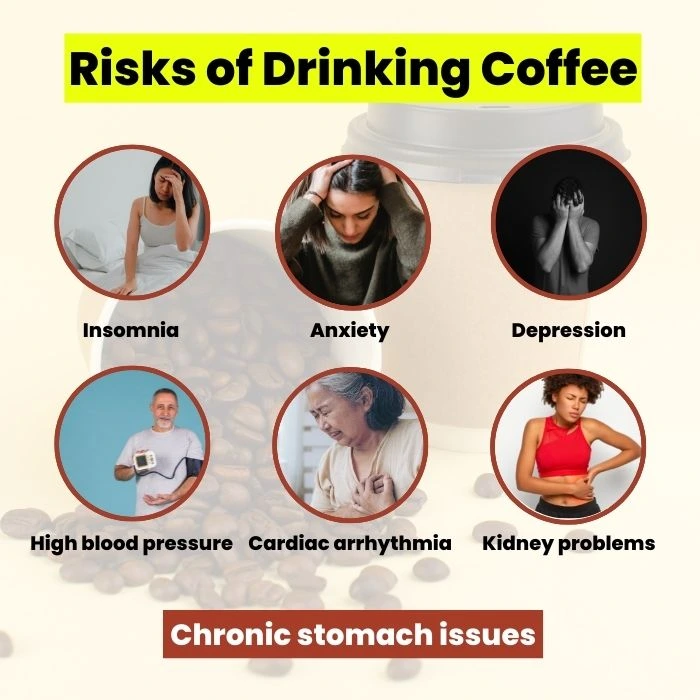If you are suffering from high cholesterol, then the question may also arise in your mind, will drinking coffee increase your cholesterol level? Because a person suffering from high cholesterol knows how much food and drink they have to avoid. Let us discuss what is the connection between coffee and cholesterol to understand it better.
What is the Connection Between Coffee and Cholesterol?
A certain amount of coffee can improve health, but an excessive amount can cause many diseases. It should be avoided by people with cholesterol problems.
As reported by Medical News Today, many studies have shown that drinking coffee increases a person’s serum cholesterol level. It also depends on you what type of coffee you are drink and in how much quantity.
Women and men experience different effects from coffee on their cholesterol levels. In 2016, research found that coffee consumption increases bad cholesterol levels. Caffeine does not affect cholesterol, but oil found in coffee beans does.
Is Coffee Bad for Cholesterol?
Often, the question on people’s minds is whether drinking coffee will increase their cholesterol levels. It is true that coffee is bad for cholesterol, but there is no evidence to suggest that coffee has a significant effect on cholesterol levels. According to some studies, coffee may lead to a slight increase in cholesterol levels, while other studies have shown no impact. In general, there is no conclusive evidence.
Why is Coffee Bad for Cholesterol?
Caffeine in coffee does not affect cholesterol, but its oil does increase cholesterol. In coffee, there are two natural oils, cafestol and kahweol, which contain chemical compounds. In unfiltered coffees like Turkish coffee, they are mostly present as fatty esters. It is possible that cafestol and kahweol may raise your cholesterol levels. Because of this, coffee has a bad effect on cholesterol.
Risks of Drinking Coffee

Additionally, coffee can significantly increase a person’s cholesterol levels and put some other health at risk. A person’s medications can be affected by caffeine, a psychoactive substance naturally found in coffee. There are a number of clinically significant interactions between caffeine and many drugs, according to the Food and Drug Administration (FDA).
Caffeine can worsen some of your conditions, such as:
- Insomnia
- thinking
- Depression
- High blood pressure
- Cardiac arrhythmia
- Kidney problems
- Chronic stomach issues
Caffeine isn’t just found in coffee. A type of jerky even contains it, as well as black tea, green tea, chocolate, and energy drinks.
Benefits of Drinking Coffee
As long as you don’t drink a lot of unfiltered or French press coffee daily, your raised cholesterol level shouldn’t be a problem. On the other hand, drinking coffee may be able to provide a number of health benefits.
- Drinking coffee daily is likely to lower your risk of diseases like Parkinson’s disease, type 2 diabetes and Alzheimer’s.
- Coffee is considered good for women, due to coffee, the risk of heart disease in women can be reduced.
- Increases energy in your body.
- Helps in weight loss.
- Improves your mental focus.
- Improves performance while exercising.
Why Your Coffee Brew Matters
Coffee oils are most concentrated in coffee brewed in a French press, which continuously passes water over the grounds as it is brewed.
The levels of cafestol in American-style pots with filters, on the other hand, are relatively low, since the beverage only passes through the grounds once.
In a 2007 study, Turkish-style steamed coffee and Scandinavian-style steamed coffee had the highest amounts of diterpenes. Instant coffee and drip-brewed coffee had “negligible” amounts, and espresso had intermediate levels.
According to research, consuming five cups of coffee daily over 4 weeks with the French press brewing method increases blood cholesterol levels by 6 to 8 percent.
What Kind of Coffee is Good for Cholesterol
Researchers have found that filtered coffee that is high in cholesterol may be a better option, but it should also not be consumed in excess. Researchers say that the more evidence you drink espresso-based drinks, the higher the cholesterol in them. Espresso is made by pouring hot water directly into the coffee, rather than slowly dripping through a filter like filter coffee.
Conclusion
There is a strong connection between coffee and cholesterol. It may depend on how a person consumes the beverage. Coffee and Cholesterol Take it in moderation, you should pay attention to how it is made, and know what ingredients it contains.
FAQ
There are very few diterpenes in instant coffee, so it does not increase cholesterol, but you should keep in mind that excessive consumption of any drink can harm our body.
As you understood above what is the difference between coffee and cholesterol. If you are drinking coffee every day, then you may have to face a condition like high cholesterol at one time or another. That is why it is important that you should reduce the habit of drinking coffee a little.
Research has seen that people who never or have never consumed coffee. There was no change in cholesterol levels in them and those who continued to consume regular coffee. That’s why it’s hard to say whether quitting coffee can lower cholesterol.
It is not proven that decaf or half caf/half decaf coffee lower cholesterol, but you might consider switching.
